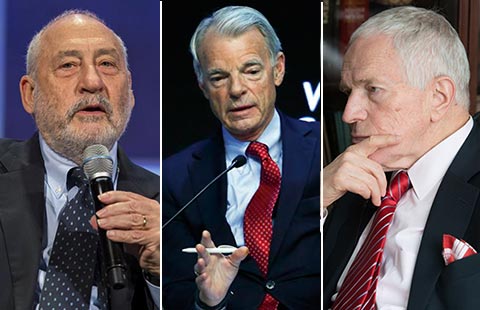China's growing investment in US not 'Trojan Horse'
(Xinhua) Updated: 2016-04-18 13:41BEIJING - Chinese investment in the United States is growing fast and has benefited its economy, but greater scrutiny and rising political sensitivities in Washington might dent its appeal.
Chinese investment in acquisitions, new operations and expansions in the United States hit a record $15 billion in 2015 and is set to reach twice that this year, according to a recent report released by the National Committee on US-China Relations, and the Rhodium Group.
Although Chinese-affiliated companies in the US create jobs for Americans, they still prefer "a factory owned by an American company that employs 1,000 workers" than "a factory owned by a Chinese company that employs 2,000 workers," a recent poll showed.
The bias is also evident in the ongoing US presidential candidate elections, as many politicians from both sides have issued dire, but ill-founded, warnings about Chinese investment, and politicians have introduced bills that propose the clamping down on traditional US openness to foreign direct investment (FDI).
The US has long been sensitive about Chinese enterprises' investment in its economy. China suffered the most investigations over the last three years despite its FDI in US lagging far behind other countries.
The reason given by US government is simple yet confusing: possible detriment to national security. However, the undefined principle is often used arbitrarily, which raises concerns of politicization.
However, Chinese investment is not "Trojan Horse" with hidden, ulterior purposes. Chinese enterprises are increasingly global-minded and eager to seek business opportunities in new markets, especially developed countries with advantageous technological conditions.
Their investment not only boosts employment and productivity, but also offers capital and markets for US firms' further development. Rising two-way investment will help improve bilateral relations, which will actually contribute to each other's national security.
Nevertheless, what Chinese investors constantly face in US are unclear investigation principles and nontransparent and complex procedures, which are daunting, and have held back many deals, hampering market allocation of international resources.
The United States should live up to its reputation of openness and abandon this cold-war mentality when dealing with Chinese investment.
The US should pick up the pace in talks with China over the Bilateral Investment Treaty to honor commitments made last year such as offering open investment environment, equal treatment and more flexible measures in case of national security concerns.
The world economy, including China and the US now faces much uncertainty, but one thing is for sure: Chinese outbound investment will continue to grow. It will be a mutually beneficial choice for all to embrace the inevitable trend in an open and fair manner.
- Belt and Road Initiative to benefit Asia with Chinese investment
- Designers recycle metal waste into artwork
- Uber eyes smaller Chinese cities to take on home-grown Didi
- Reducing social security contribution to save companies $19b annually
- China to continue upgrading foreign trade in accordance with WTO rules
- China's economic policy adjustment messages get accepted by intl investors
- Knocking out a worry of hard landing
- Making biochips for the world
















